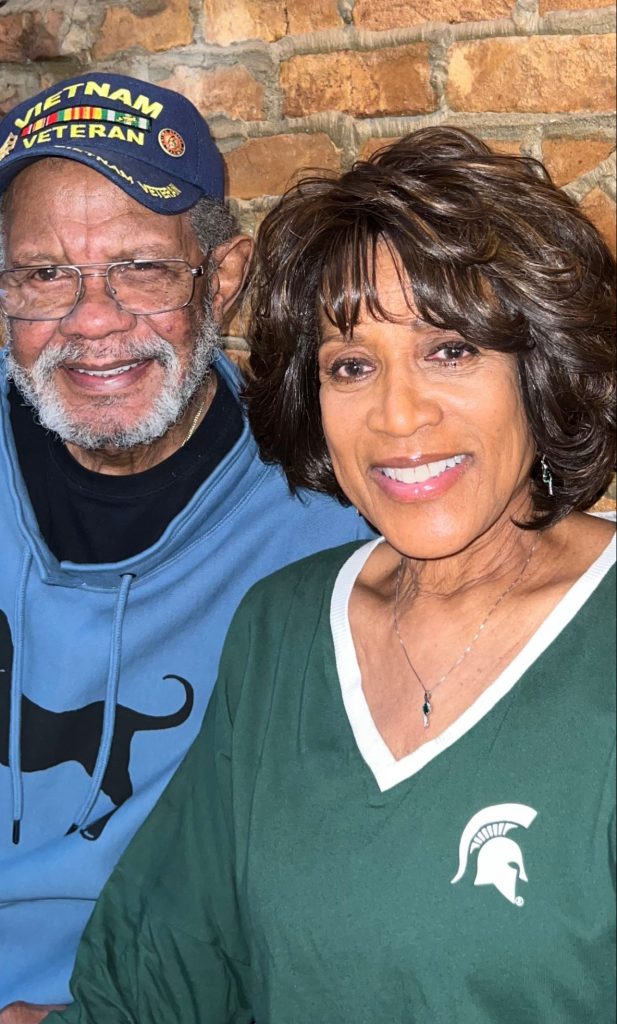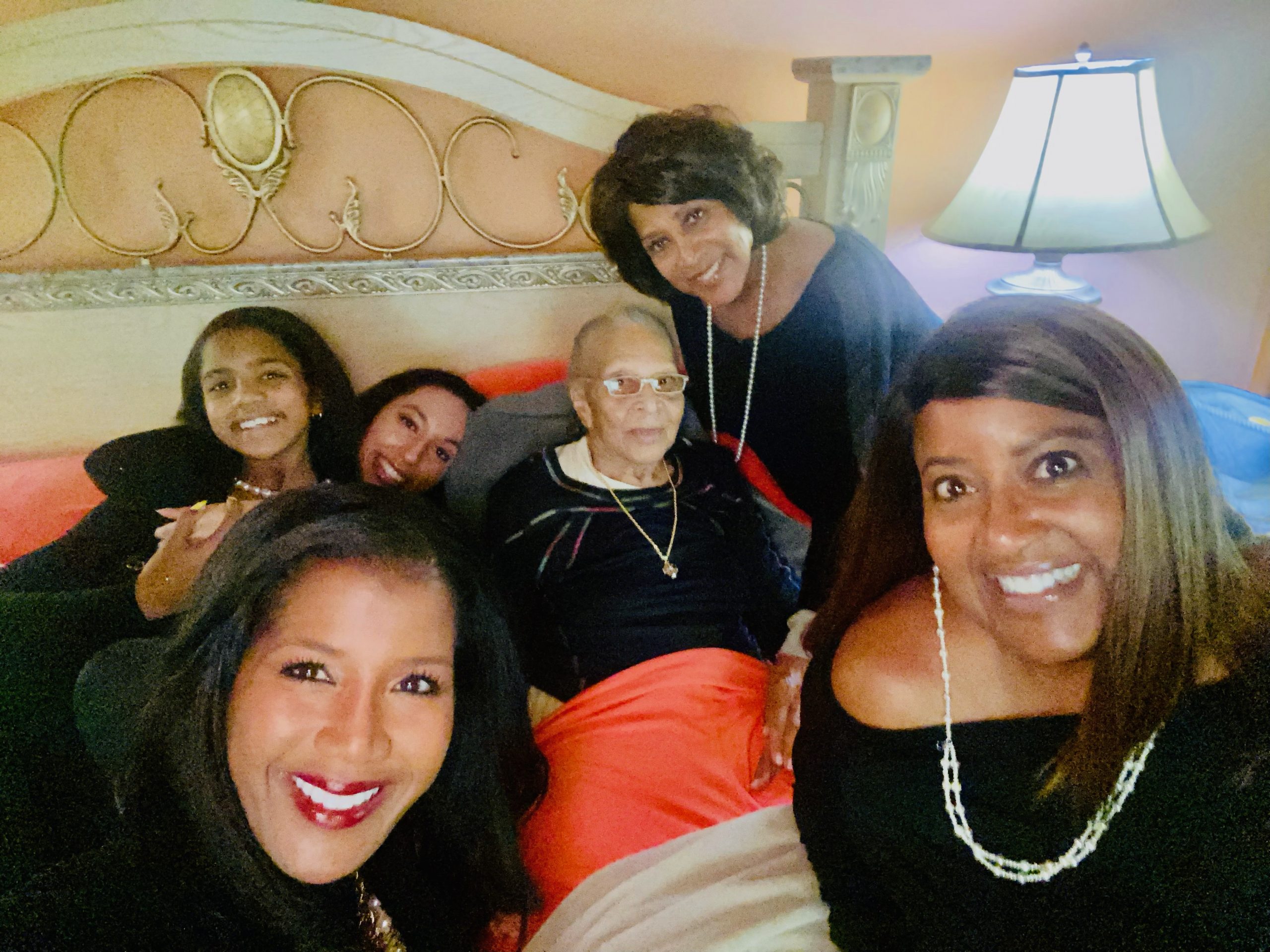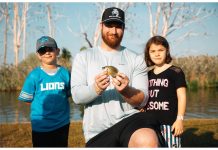The humidity comes as a surprise. But then, so does sitting poolside in the middle of a Michigan winter. Diana Lewis is at home and in her element as the warmth from her house reacts to her poolâs cool water, setting a hothouse atmosphere in snowy Farmington Hills.
Ten and a half years into retirement from , Lewis, now 80, takes three weekly swims. âItâs rejuvenating to me. Itâs that healing that was in the Bible, like when youâre baptized and you go down into the water and come up anew.â
Looking over the pool, the edge of which sits mere feet away from the front door and occupies what could have been a living room if the builder had less vision, Lewis calls herself a typical Pisces and then backtracks. âA true Pisces,â she says. âNot typical, but a true Pisces.â Lewis, coincidently, is dressed in an oversize black sweatshirt bedazzled with her astrological sign. The constellation has many folkloric interpretations but, most simply, represents two connected fish swimming in opposite directions. Lewis doesnât elaborate, but according to the zodiac, a true Pisces is someone warm and compassionate, deeply attuned to the needs of others.
Metro Detroit last saw their daily dose of Diana Lewis in their living rooms when she took to her anchor desk one last time on Oct. 3, 2012, after 35 years on WXYZ and 44 years in journalism. During that time, she had achieved many honors, including multiple Emmy Awards, the Governorâs Lifetime Achievement Award, and being inducted into the Michigan Broadcasting Hall of Fame. Sheâs interviewed countless celebrities and dignitaries, received a tennis lesson from Venus Williams, and spoken before the state Senate on the issue of organ donation.
Many of these moments were featured in a televised special on her career that aired on Oct. 4, 2012. In that special, Lewis spoke so rousingly about using her retirement to be active in the community that legendary newscaster Bill Bonds suggested she run for mayor. In another clip, Lewis laughed with retired meteorologist Jerry Hodak about her plans to nap while wearing her Michigan State University pajamas.
After a dazzling, award-winning, and boundary-shattering career, Lewis anticipated a life off-air of fishing and traveling around the United States with her husband, Glenn Lewis. âThere were a few things I just wanted to see,â she says. âInstead, God had another plan.â
Shortly after she retired, Glenn, who had also retired from WXYZ as the stationâs first Black editor and who has a resume that includes editing sound effects for Paramount and Universal Pictures, began to experience short-term memory loss and PTSD as delayed effects from his two tours of duty as a Marine sergeant in Vietnam. His health began to decline further as more symptoms surfaced, including severe ear ringing from his years as an award-winning trapshooter and an active â and the first Black â member of the Birmingham Gun Club. Lewis shelved her retirement plans to care for Glenn.

Even before retiring, Lewis cared for her family. In 1996, her stepfather passed away, leaving her then-78-year-old mother, Doris Spann, alone in their hometown of Coatesville, Pennsylvania, with Lewisâ brother, Jim â who had kidney disease that had reached a âcritical stage,â Lewis says. She encouraged them to move to Michigan, but Jim protested. As she recalls, her mother and brother each thought they were taking care of the other. In truth, Lewis called long-distance up to five times per day to quietly assume the business of running their household.
The setup buoyed the family until January 2021, when Jim was diagnosed with a blood clot. A month later, while Lewis was on the phone with her mother, he had a massive heart attack and died. âMy only sibling was gone. My world was shattered. But I had a disabled husband and a mother who was then 101 who needed me. I still havenât had a chance to fully grieve the loss of Jim.â
As she made funeral arrangements, her daughters, Glenda and Donna, moved their grandmother back to Michigan and into the family home. âThe first decision I made was that I was never going to put my mom in a nursing home or put my husband in a VA center. I would take care of my family.â
Lewis describes her motherâs arrival as a godsend because they were able to catch up after years of living apart. And, because Glenn stabilized â Lewis says the pair realized he was most content with a good meal and a movie he could watch with the professional eye honed from his Hollywood editing career â Lewis could focus on her centenarian mother.
Lewisâ latest iteration of normal required letting go of the mother-daughter dynamic as she knew it. âMaybe because it can be as difficult for a mom to be mothered as it is difficult for a daughter to mother,â she says in reflection. But, if there was any tension, Lewis remembers those moments melting into laughter and gratitude for still having each other. And there was lots of laughter on the good days, as these days were filled with visits from Glenda, Donna, and their daughters, Kamerin and Audra. Sometimes the family would watch Dancing with the Stars and chitchat while critiquing the dancers.
Mrs. Spann also liked watching General Hospital, which airs daily at 2 p.m. Lewis notes it was the only moment where time mattered. Other time markers, like bedtimes and weekends, slipped away as her mother required even more care. Lewisâ days transformed into 24-hour shifts as her mother slept less and less and struck up late-night conversations with her sister, who had passed on years earlier. Not wanting to confuse her mother, Lewis would stay up until dawn answering as if she were her deceased aunt. Then, she would head to the kitchen and prepare for her husband to wake up.
âMy mother said to me while she was here, âI donât think you should have been a newsperson; I think you should have been a nurse because your touch is so soft and you make me feel so good every day,ââ Lewis says.
A Rising Star

Lewis almost did not become a newsperson. She spent much of her youth in Coatesville, Pennsylvania, volunteering in nursing homes â she and her mother would go every Saturday to spend time with the elderly residents. The time was so formative for Lewis that she initially pursued a career in social work, first working with troubled youth at the now-shuttered Embreeville State Hospital and then with special education students at Scott Intermediate High School, where she was a 1961 graduate.
As a teacher, Lewis worked with young men on resilience. In 1968, a few years into her teaching career, her stepfather spotted an article in the paper about Philadelphiaâs WPVI-TVâs needing a part-time assistant producer for Black Book, a program about issues in the Black community. He encouraged her to apply, and she got the position and began handing out flyers around the community, asking people to contact her with concerns.
That same year, she organized with other Black teachers to stay home to honor the Rev. Martin Luther King Jr. after his assassination. âEveryone agreed to stay home,â she recalls, but when the principal called her the next day, she learned she was the only teacher who had honored that agreement. To her surprise, he explained that she would still receive pay for the day and that he would work with the school system to recognize King. For Lewis, staying home to honor King was personal. The civil rights icon had been in his early 20s when heâd stopped by her West Chester, Pennsylvania, church to preach on a day she was reciting scripture. At the end of the service, King perched the 11-year-old Lewis on his knee and said to her mother, âShe is destined to be a communicator.â
Years later, those words from King still rang true for Lewis. As much as she enjoyed teaching, she says she felt like there was just something more for her to do. And that chance came a few months into her assistant producer role when she began writing and preparing a script for Maya Angelou, Black Bookâs next guest.
âEverything was set,â Lewis recalls of the day. âAnd I canât wait to meet her.â
ÌÇŴÄvlogḞĠṪṡḞæs before the taping, Angelou sent notice that she was too sick to travel from New York City to the set in Philadelphia. Lewis went to Jim Blocker, her producer, about what to do next. He looked up and said, âKid, youâre on.â
âI said, âWhat do you mean Iâm on?â and he said, âYouâre going to do this taping. Youâre ready for this. Youâre a public speaker, youâre in touch with the people, you have good charisma.ââ Lewis remembers gasping in panic before a quiet confidence washed over her. âI relaxed, and I said, âThank you.ââ Blocker quickly shot back, âYou gonna do it for me?â âI said, âIâm going to do it for me. And for the Black community. Iâm going to do it for my family. Iâm going to do it. Yes, sir.ââ
That Sunday, Lewis gathered her family around the television to see her debut. âI looked at my stepfather and I watched my mom, andÌýso help me, something came over me because they went by the fact that it was me. They were really interested in what I was saying,â she says. âI recognized that I had the attention of my mom and stepfather; they were really listening to me.â

This was when, as Lewis says, âsomething went âclick.ââ She not only wanted to talk to people, but she wanted them to talk back to her with their issues and concerns so she could do something about them. âI claimed my voice, so help me, to be a voice for the people.â
Lewis did not speak with Maya Angelou again at all that year. They only met in person 45 years later, in 2013, when Lewis and her daughter Glenda introduced Angelou at an event for Detroit Public School teachers at the Fox Theatre. The three embraced backstage. âShe said [to us], âI had no doubts that you would achieve what you have achieved. Iâm especially proud to see your daughter here.ââ
Glenda, who joined WXYZ in 2003 after time on the air in Flint and Lansing, remembers the high emotions of the moment. âShe held us and called us the âLewis dynasty.â We cried,â Glenda says.
Lewisâ career catapulted after Black Book when the station hired her as a newscaster. But, due to the climate of the time, Lewis says she felt pulled between being the woman who read the âcookie sheetâ news of who won the bake-off before commercial breaks and the staccato-voiced woman in a three-piece suit trying to hold her own next to her male colleagues.
Lewis eventually left WPVI and moved to Los Angeles with Glenn and Donna in April 1974. She would give birth to Glenda that December. In LA, Lewis became a consumer investigative reporter. One morning, the day after a segment aired of her reporting on how a child became ill after eating tainted refried beans, she received a call from Sylvester Stallone.
âHe said, âI follow your consumer investigator reports. I like that hard edge about you when you go in, and youâre no-nonsense,ââ she remembers. âHe said, âThatâs kind of what Iâm looking for.â
âI said, âLooking for for what?ââ
The actor was working on a screenplay about a boxer and wanted a tough, sensitive reporter to play a TV reporter in the film. In textbook LA fashion, he asked if she had an agent. âI said, âItâs Sylvester Stallone, and he wants to know if I have an agent.ââ Lewisâ newsroom mentor was in earshot and grabbed the phone: âRegis Philbin here. I represent Diana Lewis.â
Rocky premiered in 1976, one year before Lewis joined WXYZ in Detroit.
The station was looking for a confident woman to match star primetime anchor Bill Bonds in the coveted weekday 5:30 p.m. spot. It would be the first time Bonds would have a female co- anchor, so it was imperative they hire someone who could hold her own and play it straight if faced with off-color jokes. And there were plenty. âIf it was funny, I would laugh. If it wasnât, I wouldnât laugh,â Lewis says. âAnd he would look at me from the side of his eye, and he would say, âYou didnât think my joke was funny?ââ The two became great friends and one of Detroitâs most successful news teams.
When thinking about her decision to come to, and ultimately stay in, Detroit, Lewis points to her faith in God â and the network of fabulous Black women who reached out to welcome her: Erma Henderson, Kay Everett, Ortheia Barnes-Kennerly, and Aretha Franklin. In Lewisâ words, they snatched her up, embraced her, and made her feel empowered. These women are remembered for being pillars of the community. They each have outsize legacies of lifting others up. One could easily imagine the phone calls shared between them and Lewis; moments, perhaps, when they could be vulnerable to one another and then strong to the outside world.
Caring for the Caregiver

Lewisâ strength is obvious when you meet her. And caregiving has been âan unbelievable test of strength â physical, mental, and emotional,â Lewis says. âTo all your readers who are out there caring for their loved ones, my heart and prayers go out to you. The patient, of course, requires so much attention, but the thousands of people giving of themselves to make the patient as comfortable as possible need support, too.
âBecause when all is said and done, it was me. Me, who had to make sure that everyone took their meds. Me, who had to sit with Glenn or Mom when they just needed to talk. Me, who had to make sure that meals were prepared and served. âḊ Me, who had to offer as much care and reassurance to these two loves of my life as they are hurt and frustrated by the suffering that comes with aging and illness. âḊ My heart would break seeing what they were going through.â
Lewis is quick to praise her daughters here, and her voice quivers as she points to how they have each showed up while maintaining careers and families of their own. Still, even with their support, it was all becoming too much to manage independently. A light clicked on one day when a nurse practitioner who stopped in to visit with Mrs. Spann saw the toll 24/7 caregiving was taking on Lewis. The nurse asked if she would consider hospice services. Lewis balked at the suggestion, believing that hospice care was for the dying and that her mother was alive and lively. The nurse assured Lewis that the hospice care she had in mind would handle Mrs. Spannâs needs so Lewis could have her mother back as a mom, not as her patient.
âIt was as though weâd called in a team of angels,â Lewis says of the familyâs time with ProMedica Hospice Southfield. âThe kindness and comfort they brought to all of us cannot even be described.â While the care was for Mrs. Spann, they also checked in with Lewis to ask how she was really doing and came prepared with suggestions for her own wellness.
While ProMedica visited three times a week, the staff saw a need for more care and suggested an assistant visit on the days they werenât there. Lewis agreed and arranged for three additional weekly visits.

With the time back, Lewis could pour into herself. âI took the opportunity to get back in our pool. Those sessions, three times per week, were more therapeutic than I would have ever imagined. Just that little bit of respite and self-care brought me back to feeling a little more like me again.â
Mrs. Spann unfortunately passed in August 2022 at age 103. But, in the weeks before, Lewis says, the team transformed what could have been a distressing family crisis into a beautiful time marked with grace and reverence.
âTaking care of an ailing person can tax oneâs spirit more that Iâd ever thought possible,â Lewis says. âWe need to normalize the conversation and discuss our experiences with each other. We need to recognize that asking for help and support should not be seen as a sign of failure and weakness but rather as one of courage.â
Through everything, Lewis has learned the best of plans can change and to approach life moment by moment. Swimming remains a respite, even as she has resumed caring for her husband full time after he began displaying signs of early dementia.
Still, with her moment-to-moment outlook, she fills her time with connection, lighting up as she describes the network of friends she calls to check in with. One elderly friend regularly dials her up to chat about The Bachelorette. Lewis says Glenn just shakes his head while they gossip about the reality show, but itâs clear that the calls are about more than who gets a rose. âHer son spoke to me one day, and he said, âThe best therapy my mom has ever had is when sheâs on the telephone with you. She gets off and sheâs just rejuvenated.ââ
Next to connection, Lewis points to how generosity keeps her going, lowering her voice to a near whisper to say how she will quietly and anonymously pay for the groceries of families near her in the checkout line. âThey used to tell me, âGirl, youâre better when the cameras arenât on.ââ
Glenda shares her motherâs generosity, and both agree that helping others brings them joy. âWe live in that mantra where integrity is what you donât see,â Glenda says. Both say they want to focus their lives on giving back more to the city of Detroit. Lewis hints at a project she and Glenda are starting and then pauses. âGlendaâs working on so many wonderful things. I just want to be here for when it comes to fruition.â
âYou will, Mom,â Glenda replies.
As for Lewis, she still has hopes for retirement. âOne day, I plan to sit on a beach under an umbrella and write my life story. I will write as much as I can. And what I donât finish, I know that Glenda and Donna will complete for me. Now we just need a title.â
Lewis On Lewis

When Maya Angelou declared Diana and Glenda the âLewis dynasty,â she described what it has been like for Detroiters to watch both mother and daughter excel in the craft of broadcast journalism right before our eyes. Here, the two journalists reflect on their most memorable on-air moments.
Glenda: Mom, I know you have stories that could fill volumes, but do any rise above the rest?
Diana: Absolutely. June 25, 2009. We were about to go on commercial break, and in my earpiece, the producer said, âDiana, Michael Jackson is dead. Just tease it, and weâll be right back.â I said, âWait a minute! Wait a minute! What do you mean Michael Jackson is dead? Tell me more. Now! I canât just say that and go to break! You canât do that to our audience!â My hands got clammy, and I broke out in a sweat. I loved that kid. Iâd followed his career from day one. So, I held up going to a commercial. It probably cost the station some ad money. But I didnât care. This was huge! It was the story of the decade!
And then there was Rich Fisher. One night, he was filling in for Bill Bonds. The camera was on me, and he turned away and ducked down. When he sat back up, he wore Bondâs little readers and an identical toupee. Well, I just lost it. I have not laughed that hard before or since. Tears were streaming down my face. I was known for being unflappable. But not that night. I could not pull myself together. The harder I tried, the harder I laughed. While he kept a straight face, I was still crying and could not finish the segment. For years after that, Channel 7 had an annual dinner at the Golden Mushroom on 10 Mile Road, where the highlight of the evening was the blooper reel. Richâs stunt was included on that reel every year. I still laugh just thinking about it. Rich brought me so much joy. He was a dear to work with.
¶ÙẅḟĠṗĠÔĠṗ:ÌýHow about you, sweetheart? In our business, I know youâve also had some moments. Tell me about a time youâll never forget.
Glenda: I have so many wonderful memories working with you. But one that really stands out was when the late Muhammad Ali whispered, âSheâs beautiful,â in the softest, sweetest tone about you. Another was when the late Congressman John Lewis hugged me and told me to âbe the change.â The moment touched me so deeply that I sobbed to you about it while driving home.
Of course, every day that I had the pleasure of us being deskmates. It was almost symbolic the way we sat, you in front, leading and guiding, and me behind, having your back. And I canât forget the nights you would wait for me after my 11 p.m. live shots so we could head home. Or when you left âlunch moneyâ on my desk for me and my photographer.
The memories are endless, and Iâm just so thankful.
This story is part of the April 2023 issue of ÌÇŴÄvlogḞĠṪṡḞæ Detroit. Read more in our Digital Edition.Ìý
|
| Ìý |
|








